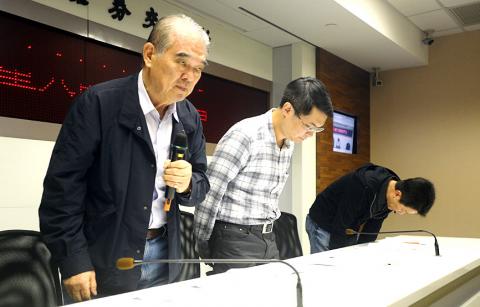A food company has been caught adulterating olive oil it claimed was pure and imported from Europe with substandard oil from Chang Chi Foodstuff Factory Co, the Food and Drug Administration (FDA) said in its latest report on edible oils.
Of the 76 oil products listed by the administration on Thursday as suspected of being substandard because their fatty acid composition did not meet national standards for edible oils, 24 have passed inspection and 40 confirmed as doctored so far, according to the report.
There are still 11 items pending further examination, while the manufacturer of the remaining product under investigation has been referred to the administration’s prosecution and investigation unit to determine the veracity of its claim that it has no more raw samples of its pure coconut oil left to submit for assessment.

Photo: Lin Cheng-kung, Taipei Times
Seven of the 40 substandard oil products were named yesterday, and six of those seven were olive oils from Greater Taichung-based Formosa Oilseed Processing Co that were being marketed as imports from Italy or Spain.
“The products are all labeled as ‘olive oil’ without specifying that they are mixed with other kinds of oil. The inspection showed that they are all adulterated with either sunflower seed oil, salad oil or canola oil,” said Chen Shu-hui (陳淑惠), an official with the Greater Taichung Health Bureau.
Two of Formosa Oilseed’s six adulterated olive oils are 50 percent Chang-chi oil and 50 percent canola oil, according to Chen.
“The other four do contain some olive oil from Italy or Spain, but they are still not 100 percent olive oil since they are blended with sunflower seed oil and salad oil,” she said.
The company is to be fined at least NT$15 million (US$510,000) for the six oil products and its “dishonesty when questioned by the authority,” Chen added.
“A NT$2 million fine will be levied for each of the adulterated oil products,” bureau Director Huang Mei-na (黃美娜) said, adding that a NT$3 million penalty is to be imposed for Formosa Oilseed’s dishonesty and unwillingness to cooperate with inspection staff.

CHANGING LANDSCAPE: Many of the part-time programs for educators were no longer needed, as many teachers obtain a graduate degree before joining the workforce, experts said Taiwanese universities this year canceled 86 programs, Ministry of Education data showed, with educators attributing the closures to the nation’s low birthrate as well as shifting trends. Fifty-three of the shuttered programs were part-time postgraduate degree programs, about 62 percent of the total, the most in the past five years, the data showed. National Taiwan Normal University (NTNU) discontinued the most part-time master’s programs, at 16: chemistry, life science, earth science, physics, fine arts, music, special education, health promotion and health education, educational psychology and counseling, education, design, Chinese as a second language, library and information sciences, mechatronics engineering, history, physical education

DEADLOCK: As the commission is unable to forum a quorum to review license renewal applications, the channel operators are not at fault and can air past their license date The National Communications Commission (NCC) yesterday said that the Public Television Service (PTS) and 36 other television and radio broadcasters could continue airing, despite the commission’s inability to meet a quorum to review their license renewal applications. The licenses of PTS and the other channels are set to expire between this month and June. The National Communications Commission Organization Act (國家通訊傳播委員會組織法) stipulates that the commission must meet the mandated quorum of four to hold a valid meeting. The seven-member commission currently has only three commissioners. “We have informed the channel operators of the progress we have made in reviewing their license renewal applications, and

The High Prosecutors’ Office yesterday withdrew an appeal against the acquittal of a former bank manager 22 years after his death, marking Taiwan’s first instance of prosecutors rendering posthumous justice to a wrongfully convicted defendant. Chu Ching-en (諸慶恩) — formerly a manager at the Taipei branch of BNP Paribas — was in 1999 accused by Weng Mao-chung (翁茂鍾), then-president of Chia Her Industrial Co, of forging a request for a fixed deposit of US$10 million by I-Hwa Industrial Co, a subsidiary of Chia Her, which was used as collateral. Chu was ruled not guilty in the first trial, but was found guilty

Taiwan People’s Party (TPP) Chairman Huang Kuo-chang (黃國昌) yesterday appealed to the authorities to release former Taipei mayor Ko Wen-je (柯文哲) from pretrial detention amid conflicting reports about his health. The TPP at a news conference on Thursday said that Ko should be released to a hospital for treatment, adding that he has blood in his urine and had spells of pain and nausea followed by vomiting over the past three months. Hsieh Yen-yau (謝炎堯), a retired professor of internal medicine and Ko’s former teacher, said that Ko’s symptoms aligned with gallstones, kidney inflammation and potentially dangerous heart conditions. Ko, charged with